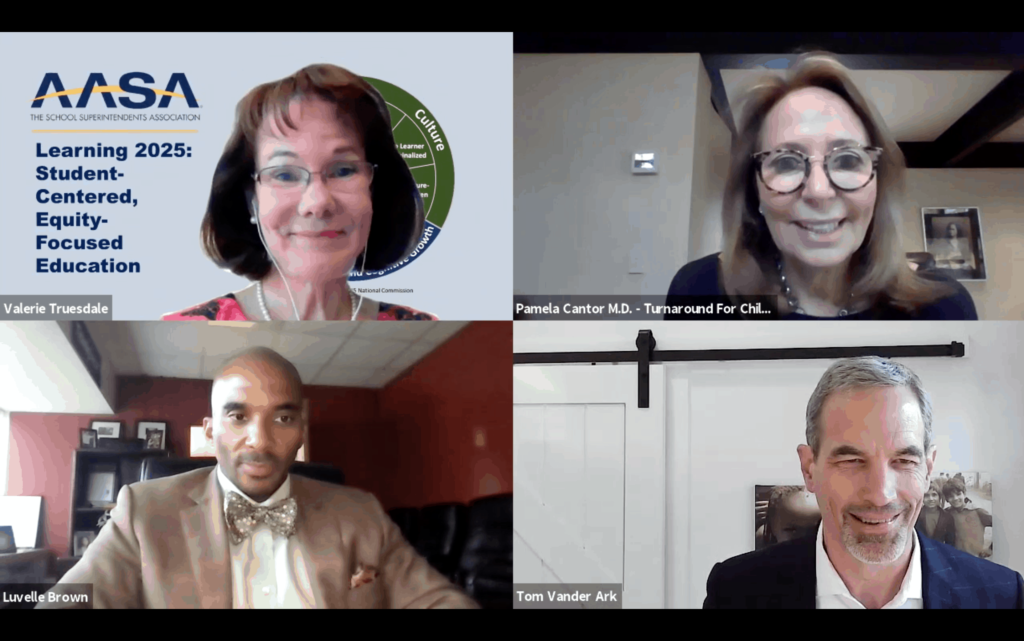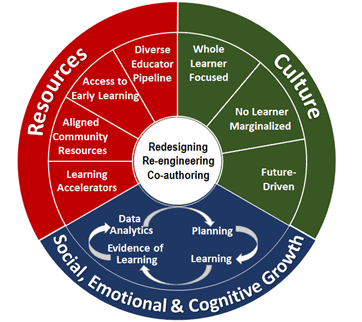Dr. Luvelle Brown, Dr. Pamela Cantor and Dr. Valerie Truesdale on the New Vision For Student-Centered Equity-Focused Education

On this episode of the Getting Smart Podcast we’re joined by three esteemed guests to discuss the new AASA Report issued by the Learning 2025 Commission, which makes a commitment and a recommendation for whole child design.
Dr. Luvelle Brown (@luvelleb) who is currently serving as the Superintendent of the Ithaca City School District (ICSD) in Ithaca, New York. We’re also joined by Dr. Pamela Cantor (@DrPamelaCantor), founder of Turnaround for Children and currently a governing partner of the Science of Learning and Development Alliance. Lastly, we are joined by Dr. Valerie Truesdale (@ValerieTruesdal), Deputy Director of AASA, The School Superintendents Association.
Let’s listen in as Tom talks with these guests about the findings in the new report and why a commitment to whole child design is more important than ever.
The new report, An American Imperative: A New Vision of Public Schools was created by Learning 2025: A National Commission on Student-Centered Equity-Focused Education, a group of superintendents and thought leaders launched earlier this year by AASA.
This commission consisted 27 commissioners, representing everything from CEOs and nonprofits and gathered to ask the question: “If you were to redesign education to be more student focused and future forward, what would you to?”
The group rallied around a whole learner approach and utilized some of the resources from Turnaround for Children, such as the building blocks, to better guide this decision making and creating. Whole child says that human development is the umbrella, focus on relationships, building a culture of safety and belong, rich productive learning experiences, developing skills and mindsets and developing integrated supports.
Dr. Luvelle Brown pushed throughout the meetings to have DEI language reflected throughout the doc: “It’s not a one-off, not an addition — it’s embedded deep into the fabric of what we’re doing.” He learned from his parents about how to “call people in rather than calling them out — welcoming folks, inviting folks and supporting folks on their journey.” This was an effective and powerful way to get everyone rallied around a common purpose, rather than isolating.
One key takeaway was “no learner marginalized.” This commitment came about through thoughtful discourse and helped to formulate one of our favorite elements of the report — co-authorship. The AASA agenda will be shaped in the years to come by a commitment to inviting learners into the design process in order to better personalize learning and equip young people with the skills and supports needed to thrive. “[This approach] empowers learners to become co-authors as they develop agency. Teachers evolve too, advancing student voice and agency. Teachers are engaged as co-leaders in the redesign of the school system.”
Dr. Pamela Cantor added, “The single most important word in human development is “co”, the entire development of us as human beings is relational. What I know will get released is the energy that comes out of kids when they feel like they own.”
When reflecting on the experience of being a part of the commission, Dr. Brown said, “Things really slowed down for me. I can see things more clearly than I have before. As an abolitionist educator, you will never see the fruits of our labor. I hope I’ve inspired someone to take my place when I’m gone. It may take us til 2025-35.”
Dr. Cantor added, “The idea that I would be part of a group of people with different backgrounds/experiences to share this point that we can drive young people, from wherever they begin, to their greatest potential…”
Lastly, Valerie Truesdale said, “To have been able to channel the brilliance of each of these educators into a set of recommendations. This is legacy work, when we’re said and done, we will know that this work made a difference.”
Links:
- Learning 2025 Report
- Twitter: Dr. Luvelle Brown
- Twitter: Dr. Pamela Cantor
- Twitter: Valerie Truesdale
- Science of Learning and Development Alliance
- Ithaca City School District
- Turnaround for Children Toolbox
- AASA
To find out more about sponsoring or advertising on GettingSmart.com, please email [email protected]





0 Comments
Leave a Comment
Your email address will not be published. All fields are required.